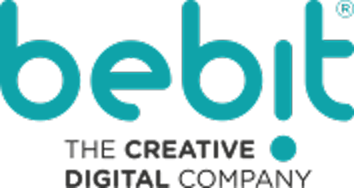Press
Artificial Intelligence and Creativity: challenges and opportunities according to Bebit
Interview with Riccardo Barbazza, Executive Creative Director of Bebit and Cristian Muraro, Innovation Manager
Artificial intelligence and creativity: a possible combination? And with what results?
According to a report by the Capgemini Research Institute, the majority of marketing executives (62%) believe that generative AI, for example, will strongly boost human creativity, improving its main qualities.
Riccardo and Cristian, what opportunities and challenges does artificial intelligence present for creativity and marketing?
[Riccardo]: «As far as the work of creatives is concerned, AI should be seen a bit like a superpower that amplifies their capabilities: something that can help them develop their ideas faster, helping to simplify some steps of the creative process. Artificial intelligence in this sense is changing the possibilities and ways of working, especially in terms of timing and the role of creatives, which will be less and less executive and more and more strategic and visionary.
The real challenge is to be able to respond to these changes lucidly, knowing how to enhance talent with appropriate methods and workflows. The way of thinking about the virtual experience is also changing, which can be developed by integrating human creativity with that generated by AI, giving rise to new experiences for end users and serving brands.».
[Cristian]: «From my point of view, there are numerous new opportunities regarding the type of content that can be generated with the help of AI: videos, images, PPT presentations, websites, digital and non-digital brochures. But also generating 3D environments and simultaneous translations, hyper-dynamic websites (platforms that are updated in real time thanks to AI) and intelligent avatars or "meta-humans", i.e. applications that can be integrated within websites as speaking virtual assistants and that offer the possibility to better understand the user's needs, while communicating relevant information on brands, products and services thanks to artificial intelligence. The biggest challenge in this sense is, for artificial intelligence, to reach a level of general completeness that allows it to broaden its overall vision, which is currently certainly still very limited.».
So, is it still important to rely on human specialists rather than depending exclusively on technologies?
[Riccardo]: «Certainly, yes. AI alone is not able to operate and guarantee satisfactory results, and human intervention is always fundamental to complete the work. Artificial intelligence will always be linked to human work, such as the information on which it is based and from which it learns. Furthermore, AI - as also pointed out by Cristian - still has major limitations: the lack of an overall vision, critical sense and sensitivity do not (yet) allow it to convey the nuances that a creative output needs to communicate, such as the tone of voice or irony.».
[Cristian]: «AI can be much more accurate than a human on certain specific mechanical and repetitive tasks, but it is much less accurate when it comes to having a global vision of a project. For now, therefore, AI is still totally dependent on human intervention. People are able to integrate any type of output with an emotional, creative and personal touch that at the moment is still impossible to replicate or replace with a machine. Furthermore, AI is not yet able to consider and estimate more practical aspects, such as making strategic business, marketing or IT decisions, managing human resources or understanding the degree of commercial sensitivity of a client. AI is therefore proving to be a very useful tool to support operational and knowledge-hungry teams, leading to an overall saving of time and money, but much less useful to management teams who are required a series of purely human skills.».
So, what is the secret to interacting with AI effectively?
[Riccardo]: «AI in this sense is a tool with which creatives must first learn to interact in order to generate a series of visual and textual outputs that can represent a good starting point for setting up a creative work. It is not so much a matter of knowing what to ask, but knowing how to ask it. To achieve an optimal result, it is first necessary to ask things with a certain level of detail: from textual nuances to visual details and particulars. It is also necessary to have very clear ideas, because it is a matter of having a dialogue with a tool that takes us literally without the ability to read between the lines, and which - where not specified - does its own thing, often with unsatisfactory results. Only by keeping these aspects in mind and with experience will you learn to know the way in which AI interprets what is asked of it and to insert increasingly effective prompts».
[Cristian]: «To explain what interacting with AI means, let's take a step into the history of Philosophy. In Platone's "Menone" is told the encounter between Socrates and an uncultured slave; Socrates wants to prove that knowledge is something to which everyone can aspire and asks the slave a series of targeted questions to lead him to demonstrate the Pythagorean theorem. Obviously, Socrates manages to hit the target and shows that the slave has reached this conclusion by himself, since his help has served only to remember a knowledge already existing in the soul of the slave. Interacting with AI is, conceptually speaking, a modern revisitation of Platonic Maieutics. In fact, when we develop a prompt for AI it is important that we have clear the objective and, first of all, that we ask ourselves questions that attest or deny the consistency of our request. Just as Socrates guided the slave through a series of targeted questions to reveal pre-existing knowledge, interacting with AI requires a similar process. When we formulate a request or a prompt for AI, we are essentially engaging in a sort of dialogue, asking ourselves questions to verify the coherence and completeness of our request. This parallel implies a responsibility similar to that of Socrates in asking key questions to extract the truth from AI, highlighting how the elaboration of an accurate and well-structured input is crucial to obtain a satisfactory answer».
Libera Brand Building Group has always been interested in new technologies. Cristian, as the Technology Manager of the group, can you explain why it's important not to be afraid of technology and not to lag behind the innovations that the market offers?
[Cristian]: «It is crucial for companies, including Libera Brand Building Group, to embrace new technologies without fear and keep up with the latest innovations on the market. The rapid evolution of Artificial Intelligence has started a process of pervasive automation, especially in the field of digital communication. This transformation is becoming a central element for any type of organization, even for those with a long tradition. In Bebit, the digital company of Libera Brand Building Group specializing in the development of high-impact strategic and creative digital communication and advertising projects, I am in charge of discovering and researching new technologies, creating internal and external training moments for everything related to both the development of 3D environments and the functionalities of AI. Together with the creative team, we are committed to creating new, increasingly interactive and customizable brand experiences. It is essential for brands to be guided in the exploration of new technologies to remain relevant over time and position themselves as pioneers and innovators in the market, involving their target audience in ever-changing ways».

